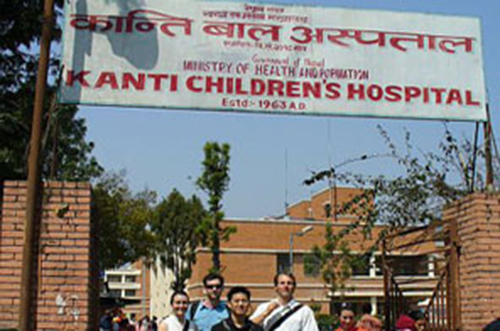Recurrent pneumonia prevalent among Nepali children
Kathmandu, December 25
On an average one in nine children with pneumonia has recurrent pneumonia.
In a study conducted by Dr Prashant Rijal and his team at Nepal Medical College Teaching Hospital on 653 patients of the hospital from July 2013 to June 2018, 74 were diagnosed with recurrent pneumonia. Children between two months and 15 years of age who had a history of two or more episodes of pneumonia were studied. “Air pollution, overcrowding, malnutrition, congenital anomalies, congenital immune deficiency, gastroesophageal reflux (return of stomach’s contents back up into esophagus), lack of availability of vaccines are some of the reasons for the recurrence of pneumonia in children,” according to Dr Rijal.
Pneumonia is a form of acute respiratory infection caused either by virus, bacteria or fungi which affects lungs. “Multiplication of such organisms leads to swelling of the lungs. When an individual has pneumonia, air sacs in the lungs are filled with pus and fluid. It makes breathing difficult and painful,” he said. Premature babies, babies with low birth weight, babies who are not exclusively breastfed and are not immunised are prone to pneumonia.
Besides, babies living in polluted environment, in rooms with no proper ventilation, babies who are malnourished and those whose parents indulge in smoking are also equally prone to the disease.
Doctors have warned that cases of pneumonia will rise in the winter season.
“Respiratory infection is higher in the winter season as there is more moisture in the air,” said Bishnu Prasad Upadhyay, Consultant Microbiologist at National Academy of Medical Sciences.
According to World Life Expectancy survey, influenza and pneumonia deaths in Nepal reached 10,535 or 6.45 per cent of total deaths in 2017. Influenza and pneumonia claimed lives of 47 persons out of every 100,000 people in 2017.
The World Life Expectancy index was created using most recent data from sources like WHO, World Bank, UNESCO and individual country database. The survey is based on 50 prominent ailments and accidents that claim lives of people in 183 countries.
Though children suffer from pneumonia all round the year there is rise in the number of pneumonia cases during the winter. “It is because the virus/bacteria gets favourable environment for its growth usually in the winter and rainy seasons,” said Dr Rijal.
According to WHO, pneumonia accounted for 15 per cent of all deaths of children under five years old, killing 808,694 children in 2017, across the world. “Early diagnosis and care is necessary for children suffering from pneumonia,” said Dr RP Bichha, director of Kanti Children’s Hospital.
If children suffer from fever, cough and common cold, have difficulty in breathing, have a sore throat, immediate medical help should be sought, the doctors said.
“To prevent children from pneumonia breastfeeding, proper vaccination, keeping them away from cold, pollution and timely treatment is necessary,” said Dr Rijal.
The infection spreads via air-borne droplets from cough sneeze. Therefore, children are prone to contact the infection at schools, added Dr Bichha. Early recognition and management of the causes of pneumonia is expected to reduce the number of pneumonia related hospital admissions and mortality, according to Dr Rijal.






